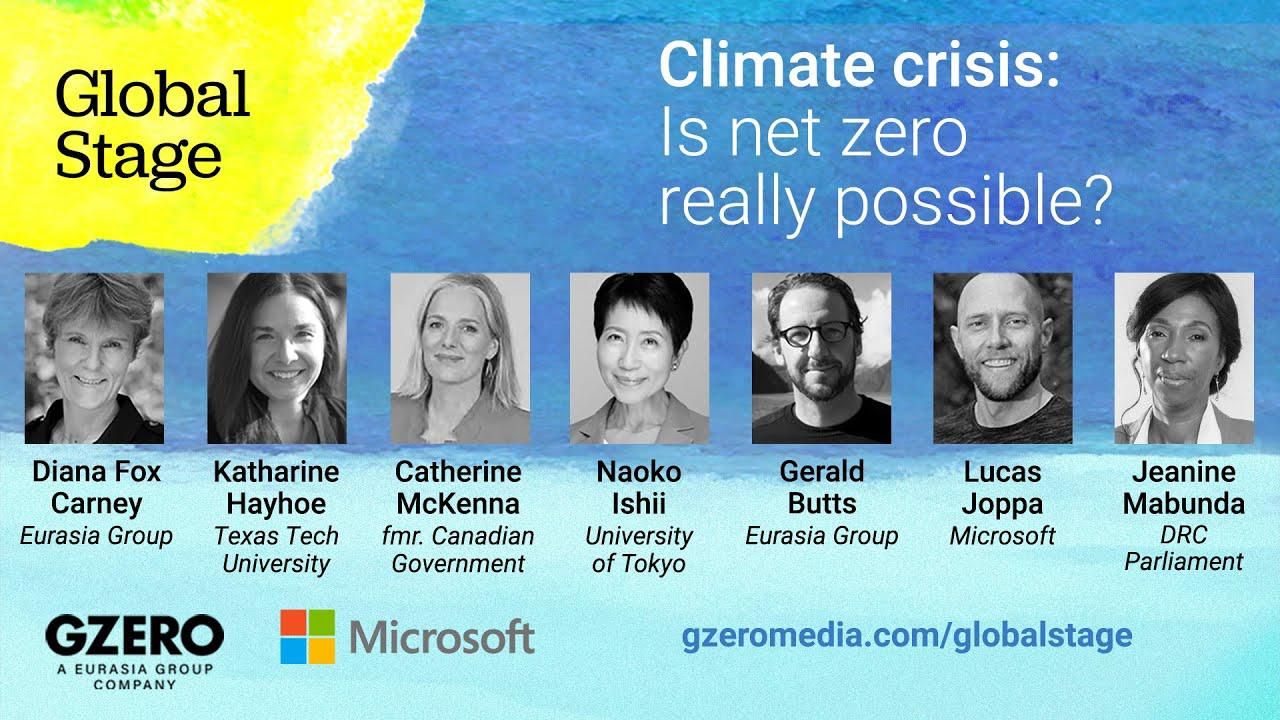Past Events
COP26 vibes so far: "What's it worth to save everything we have?"

COP26 Vibes So Far: ”What’s It Worth To Save Everything We Have? | Global Stage | GZERO Media

What's the state of play so far at the COP26 climate summit in Glasgow? Why is it so urgent to speed up climate action before it's too late? What does climate justice for developing nations really mean? And how can companies do their part without greenwashing? Several experts debated these and other questions during a Global Stage livestream conversation hosted by GZERO Media in partnership with Microsoft during the opening week of COP26, moderated by Eurasia Group senior adviser Diana Fox Carney.
Gerald Butts, vice chairman of Eurasia Group, explained the difference between climate justice and just transition to clean energy, and how the political debate on climate has moved to who's responsible to what we're going to do about it.
Atmospheric scientist Katharine Hayhoe, Chief Scientist at The Nature Conservancy and Director of the Climate Science Center at Texas Tech University., offered her thoughts on progress made since Paris 2015, why everything we do matters because climate is loading the dice against us, the need to set goals despite the human tendency to procrastinate, why we need to put value on climate because everything we have is worth saving, and why individuals should use their voices more than their actions to advocate for change on climate.
Naoko Ishii, Director of Center for Global Commons, and Executive Vice President of the University of Tokyo, detailed how we need to persuade the Japanese people to come up with a climate agenda they can own, and how to integrate the value of natural capital into economic decision-making by putting a price on carbon.
Microsoft chief environmental officer Lucas Joppa talked about why it's time for corporations to go from pledges to performance on climate action, why the private sector's role should be building climate solutions for the public sector, the importance of technology to move the needle on corporate sustainability, and why training the workforce in green skills should be a shared responsibility.
DRC member of parliament and former speaker Jeanine Mabunda Lioko discussed the paradox of a global green economy that'll still need a lot of raw materials from Africa, the facts and figures that illuminate the climate justice question, and why some climate goals are reachable for the continent — just not developing with only renewable energy.
Catherine McKenna, former Canadian minister of Infrastructure and Communities, spoke about the huge opportunity to scale up public-private partnerships on climate with blended finance, the need to track progress on top of disclosure to prevent greenwashing, and the right incentives for behavioral change on climate.At the 2026 Munich Security Conference, entrepreneur and Project Liberty founder Frank McCourt makes the case that the internet, and the AI systems rapidly reshaping it, must be redesigned to serve people, not platforms.
At the 62nd Munich Security Conference, Parag Khanna, founder and CEO of AlphaGeo, says globalization isn't dead, it's evolving. Speaking with GZERO’s Tony Maciulis, he explains that countries are forming flexible alliances that expand and shrink based on their interests. “You’d rather be in the tent...if it suits your interest than not in it,” Khanna notes, highlighting how the US, Europe, and Asia are adapting to shifting global priorities.
Sovereignty has become one of the most powerful, and least defined, words in tech policy. At the 2026 Munich Security Conference, SAP global head of government affairs, Wolfgang Dierker, explains why governments and enterprise customers are demanding more control over their data, cloud infrastructure, and AI systems amid rising geopolitical uncertainty.
On the sidelines of the 2026 Munich Security Conference, Annemarie Hou, Executive Director of the United Nations Office of Partnerships, joined Tony Maciulis to discuss the power of women leaders in global decision-making.